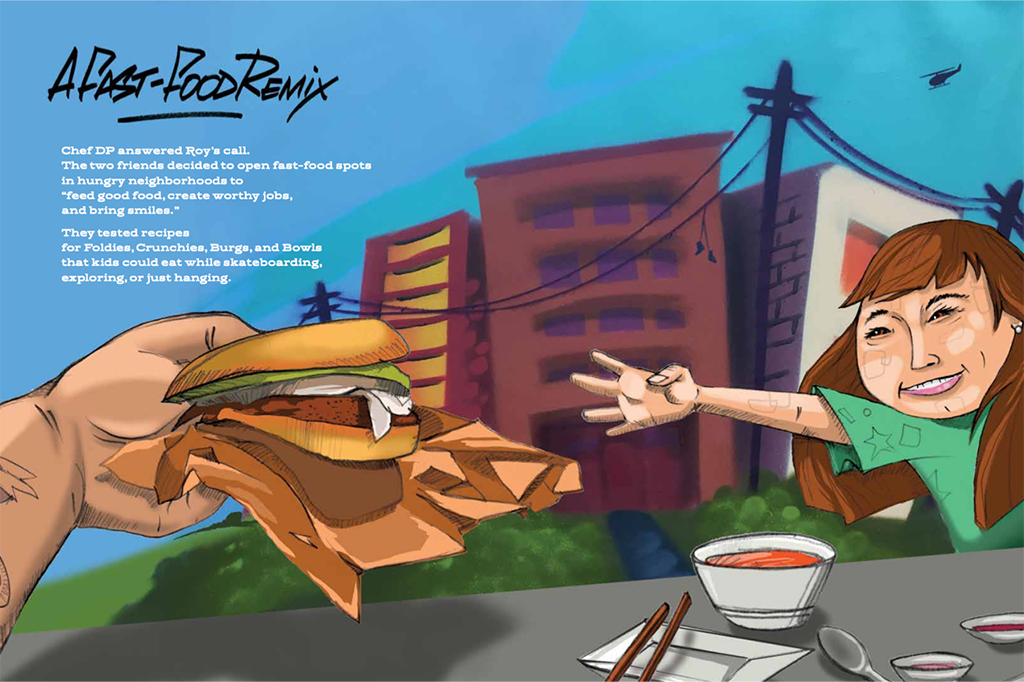By Tiffany Ran
Northwest Asian Weekly

Illustration by Man One. Courtesy of Readers to Eaters.
“If you think about Gen Z, the next generation after the millennials, they are so diverse. We were also thinking about the children who would be reading this book and their parents. It’s not even just one ethnic identity within the larger identity. So many kids today are multiethnic,” said June Jo Lee.
“My husband’s former company was Lee & Low [Multicultural Book Publishers] and they focused on not just stories of diversity, but they featured a lot of authors and illustrators who were also diverse. It was their stories to tell. The way we brought about Readers to Eaters was to build on that kind of diversity to represent what America really is today and how diverse we are. Our mission is to incorporate food culture into our stories and beautiful art to express where we come from and what we eat. We try not to be didactic, not like a ‘this is what healthy is’ or ‘this is how you should eat.’ We try to tell good food stories,” said Lee about Readers to Eaters.

Illustration by Man One. Courtesy of Readers to Eaters.
“We always look for diversity in our Food Heroes series. We did Will Allen and we did the first female chef to win the James Beard Award, Alice Waters. We wanted to do an Asian chef. Roy Choi we really liked because we were following his work with Locol (a socially conscious fast-food brand). It was because of his work with Locol that we thought that this would be a great story,” said Lee.
“Roy Choi” and Lee’s work with Readers to Eaters ties in with Lee’s work as a self-proclaimed “food ethnographer,” conducting research on food culture and food-related user experiences, and working with companies to provide storytelling, products, and services to better the food system. Through her work, Lee has kept her finger on the pulse of food trends, cultures, and behaviors and uses this data to develop insight for products, program, services, and messaging. It’s a unique career that has led her to work with companies like Kraft, Colgate, Seventh Generation, Whole Foods, and more. While researching Choi’s story for this book, Lee found a few parallels between herself and the “street cook” chef.

Illustration by Man One. Courtesy of Readers to Eaters.
In “Roy Choi,” a young Korean American boy grows up in Los Angeles and struggles to find his identity until he discovers his love for food and cooking. After his food truck business Kogi Truck takes off in Los Angeles, he opens a brick and mortar restaurant Locol with Chef Daniel Patterson (“Chef DP” as he’s known in the book) to provide quality food and opportunity for inner city youth. Choi was not involved in the writing of the book. Lee and Martin developed the narrative from a library of Choi’s work, including his speech at the MAD Symposium, online articles, and Roy Choi’s own cookbook “L.A. Son: My Life, My City, My Food.”
Sohn-maash is the “flavors in our fingertips, the love and cooking talent that Korean mothers and grandmothers mix into their handmade foods,” it says in “Chef Roy Choi and Street Food Remix.”
“Roy calls himself a ‘street cook.’ He wants outsiders, lowriders, kids, teens, shufflers, and skateboarders to have food cooked with care, with love, with sohn-maash,” the book continues.
Graffiti artist Man One brought vibrancy to the book with colorful, dream-like illustrations of the Los Angeles landscape and diverse representation of characters in the book. He paints Choi as a DJ on one page, who goes on to remix food on the next. Each page of the book bears different textures of strokes, lines, paint splatters, shadows, and colors.
“Roy’s story, like this city, is another great inspiration,” said Man One, who wrote about his love for Los Angeles in the book’s illustrator notes.
“Finding your passion and doing something you love is a great way to reach success, but the real reward comes when you start giving back to your community. There are not enough words to express the happiness that it can bring you.”
“Chef Roy Choi and the Street Food Remix” is available through Amazon, Barnes and Noble, and other major book retailers.
Tiffany can be reached at info@nwasianweekly.com.



